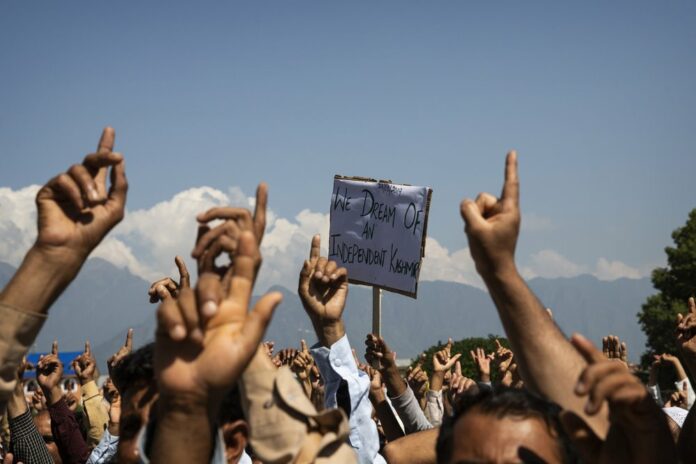Interviewer: Daniel Finn (Features Editor at Jacobin)
Interviewee and Author: Vanessa Chishti (O. P. Jindal Global University, Delhi, India)
Organization/Publisher: Jacobin (Brooklyn, New York, USA)
Date/Place: February 9, 2022/India
Type of Literature: Interview
Word Count: 6800
Link: https://www.jacobinmag.com/2022/02/kashmir-india-narendra-modi-bjp-long-reads-podcast
Keywords: Kashmir, India, BJP, RSS, and Muslim
Brief:
This interview of Vanessa Chishti from India’s OP Jindal Global University, describes how the history evolved in Indian Illegally-occupied Jammu and Kashmir (IIoJK). The academic details how the Muslim-majority region was under the brutal rule of Hindu Dogras which had imposed a system that cemented the British-era colonial structure in the UN-designated disputed region. “By the late nineteenth century, the regime, which was headed by a Hindu prince, was anchored in Kashmir by a class of largely Hindu landlords, state officials, and money lenders, while the artisans and peasants were overwhelmingly Muslim. This had very significant implications for the lines along which politics cleaved in the twentieth century,” the academic notes. She details that the Hindu Dogra autocrat, Hari Singh, was influenced by the right-wing Rashtriya Swayamsevak Sangh (RSS) – the fountainhead of the current Bharatiya Janata Party (BJP) regime in India – at the time of partition in 1947 and joined India against laid down rules under which Kashmir would be part of Pakistan. It must be recalled that the Hindu autocrat was already facing a popular resistance from Muslim subjects of then Jammu and Kashmir and thus lacked any moral strength to decide the fate of millions of people of IIoJK. “It needs to be said that the Kashmiri struggle for self-determination is not instigated by Pakistan,” the academic stresses. In her detailed presentation of the armed resistance against Indian rule, she navigates the readers through how the anti-India rebel groups flourished based on their specific ideologies. On how India controls IIoJK, the academic says: “New Delhi’s mode of dealing with Kashmir has consistently moved between tightly controlled client regimes and outright, indiscriminate military repression.” She also busts the myth that the so-called secular, leftist ruling regimes in India have been different than the Hindu nationalist BJP. “There has been a basic continuity in India’s policy on Kashmir.” “I say with absolute certainty that the overwhelming majority of people would agree on one point: not India,” the academic says about the aspirations of people of IIoJK if and when a UN-monitored plebiscite is held.
By: Riyaz ul Khaliq, CIGA Non-resident Research Associate




